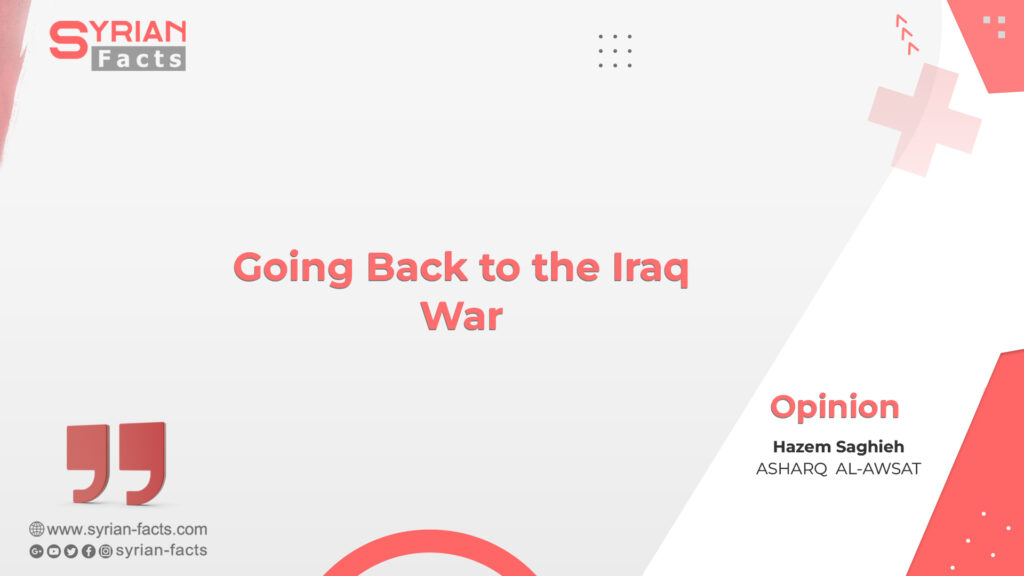The Iraq War of 2003 will continue to be a foundational event for a long time. The 20th anniversary of the war, a few weeks ago, adds to our growing “album of losses,” to borrow the title of Abbas Baydoun’s novel. The items in this album, be they Iraqi, Palestinian, or otherwise, leave us in tears whenever a year or decade goes by, and come back to make us cry constantly. And so, we declare that this is our fate and perpetuate a repetitive, dull, absolutist narrative of victimhood.
Black-and-white judgments are probably less tenable for this event than most of the others that our region has seen. Avoiding one-sided and closed interpretations of these concepts, we can say that while it was an invasion and occupation, it was also an act of liberation.
Those who overlook the first fact promise international relations that are not governed by law; a mendacious legal pretense of the sort that Colin Powel offered at the time, is enough. This is the kind of global order in which the strong can do whatever they like to the weak. Such a formula should be repudiated in principle.
The repercussions of this go beyond Iraq. The war has undermined intervention as a principle, even in the positive sense, which was denied to other countries grappling with their own tyrants. The war also contributed strongly to the West pulling back from the region. The withdrawal from Iraq thus invited Iran to “fill the vacuum,” bringing the Sunni-Shiite conflict back to the region. Indeed, this time the impetus was greater than it had been during the Iran-Iraq War of the Saddam era. On the other hand – and this also aggravated the sectarian conflict – the Iraqi misadventure compensated al-Qaeda for its loss of Afghanistan by gifting it Iraq.
Moreover, the region, whose faith in democracy had been shaky to begin with, became less trustful of democracy. Its trust in international law, which had also been shaky in the first place, dipped as well, with the US actions that undermined it supplemented by the weakening of the law in general. Thus, Iraq was ruled through cold, draconian bureaucratic measures, giving us Abu Ghraib Prison, Camp Bucca, and their atrocities. Amid the popularity of the idea of privatization during the invasion, the door was wide open to gangs of thieves and transnational armed groups supported by major powers.
Those who overlook the second fact, that the war was also an act of liberation, promise us something worse: We are talking about a regime that, despite never having been elected, remained in power for 35 years, during which it inflicted immense suffering on its people and committed a litany of crimes that include using chemical weapons against its own people and invading a peaceful neighboring country. Nonetheless, it did not fall. The fact is that, as innumerable examples demonstrate, it is extremely difficult for regimes like that of Saddam to be brought down from the inside.
Worse still, ignoring the liberating aspect disregards two other truths: The savage jungle that Saddam’s regime established dwarfs any jungle set up by foreign occupation, while belittling the fall of a semi-totalitarian regime stems from an extreme weakness of democratic sensibility.
In principle, it is no minor detail that elections have been held, parties and newspapers have been established, and a large minority like the Kurds was granted considerable freedoms under a federal system. And there is no exaggeration in associating the Iraq War, which took down one of the demigods, with the insurgencies of many Arab nations, launched less than a decade later, who sought to bring down their demigods.
Denying these meanings by turning to a poor rhetoric about the glory and unity that Iraq had enjoyed before the US intervened, which were only ravaged by its intervention, was and remains pathetic.
Rudimentary knowledge of the modern history of Iraq and the Arab Levant is enough to demonstrate that this discourse is an exercise in deception.
Where will the balance between occupation and liberation end up tipping, and what will decide one side’s victory over the other?
In all likelihood, the answer lies in the responsibility of the Iraqis themselves. And the bleak reality is that the outcome does not inspire confidence.
From the very beginning, the Shiites and Kurds were more keen on de-Baathification and dissolving the army than the Americans. We saw the emergence of the resistance supported by regimes like those of Iran and Syria, and of Sunni militants that targeted Shiites in response to this highly consequential event being seen as a Shiite overthrow of the Sunnis. All of this culminated in the 2006 civil war. And that was before the emergence of ISIS, its seizure of Mosul, and the establishment of its “state.”
In the meantime, Iraq was gifted to Iran. Politics was completely sectarianized, with elections themselves becoming part of the game of sectarian polarization while astronomically corrupt officials took refuge in communities’ sectarian loyalties and the expanding of their “share.” Most recently, the 2019 uprising made clear that collective national action that brings together the Sunnis and Shiites, and the Arabs and Kurds, has become a thing of the past.
The weakness of the Iraqis’ responsibility and the revelation of the fact that they are not a national political community were complemented by the weakness of the region’s responsibility. Indeed, the regional practical proposal for Iraq was leaving it to rot and leaving the Americans to rot in it, so that this new experiment would neither fail nor succeed.
Today we see something similar tragically unfolding in Sudan, which, as far as we know, has not been occupied. Either we say that Omar al-Bashir, Saddam Hussein, Muammar al-Gaddafi, and Zine El-Abidine Ben Ali etc., should not have been overthrown, or we think more deeply and radically about our region’s relationship with the world and itself, including the regimes that have governed it and continue to govern it.
ASHARQ AL-AWSAT





Be the first to write a comment.